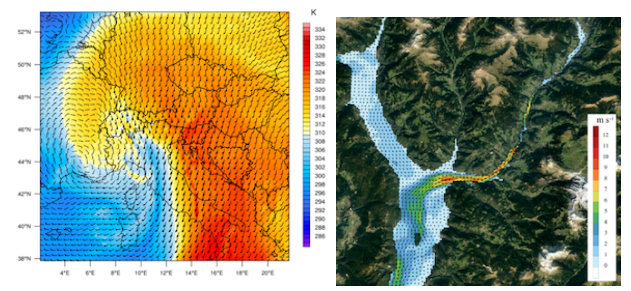Modelling and Simulation (Track 4)

Second year
Advanced environmental modelling and applications (12 ECTS)
The course deals with the real-world applications of advanced numerical methods for environmental fluid mechanics. In the first part, the focus is on methods for hyperbolic PDE (hydraulics on mobile bed) and nonlinear parabolic equations (heat equation; Richards equation for the flow in porous media), finite element methods for linear elliptic equations (with applications to solid and fluid mechanics), and on the parallelization necessary for the application to complex problems. In the second part, the numerical methods are implemented for complex transport processes, with real-world applications to: turbulence modelling; stratified flows; jets and plumes; air and water quality models. The course contains practical hands-on sessions in the computer laboratory.
Atmospheric physics and modelling (6 ECTS)
The course provides an in-depth analysis of atmospheric processes relevant for various applications of environmental engineering. In particular, the main topics covered include synoptic scale atmospheric dynamics at mid-latitudes, mesoscale phenomena in mountain areas and atmospheric boundary-layer processes. Large space is dedicated to the applications of these notions, with particular regard to the modelling tools for weather forecasting, air pollution simulations and the assessment of renewable energies.
Contaminant remediation engineering (6 ECTS)
The course provides the students with the skills needed to design remediation and management systems of contaminated sites. The first part of the course deals with the study of the movement of water and the transport of contaminants in the earth subsurface. The second part deals with risk analysis, followed by the design of remediation technologies of contaminated sites (soil and groundwater). Attention will be given also to the design of monitoring systems and groundwater extraction technologies.
Ecohydraulics (6 ECTS)
The course focuses on the interactions among morphology, flow and the biotic component of the fluvial ecosystem, providing students with tools to integrate environmental quality with hydraulic safety in river management, in line with European and national directives. A suite of quantitative approaches to the evaluation and modelling of the morphological quality, habitat availability for target species and the interactions between river morphodynamics and riparian vegetation are explored. Real-world applications refer to the design of environmental flows and river restoration projects.
In addition to the courses above 2 electives have to be chosen for a total of 12 ECTS.
Applied Machine Learning (6 ECTS**)
The course objective is to give to the student a general idea on how to develop a machine learning system. The course will cover aspects related to the model architecture, data collection and processing, until the deployment of the system. At the end of the course, the student is expected to be able to evaluate the feasibility of a simple machine learning project and he will be able to manage it deployment in all its phases. Theoretical lectures will be alternated with hands-on exercises in python.
** Elective course

